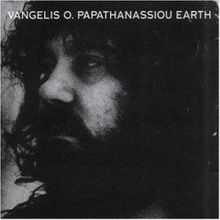Earth (Vangelis album)
| Earth | ||||
|---|---|---|---|---|
 | ||||
| Studio album by Vangelis | ||||
| Released | 1973 | |||
| Recorded |
Europa-Sonor studios, Paris | |||
| Genre | Electronica, Progressive rock, New Age | |||
| Length | 38:47 | |||
| Label | Vertigo, # 6499 693 (LP) | |||
| Producer | Vangelis O. Papathanassiou | |||
| Vangelis chronology | ||||
| ||||
| Professional ratings | |
|---|---|
| Review scores | |
| Source | Rating |
| Allmusic | |
| Piero Scaruffi | (5/10)[2] |
Earth is the third solo album by the Greek artist Vangelis, released in 1973. It is a prime example of the progressive rock of the day. In contrast to Heaven and Hell (1975) and some soundtracks by Vangelis from this period, Earth was not released on compact disc in the 1980s — it was not until 1996 that a CD version was made available, and then only in Greece.
Richelle Dassin wrote the lyrics.
In 1974 two left-over tracks from the recording sessions for Earth were issued as a single, on the WWA label: Who, written by Fitoussi and Dassin on the A-side and featuring vocals by the former, and the instrumental Sad Face, by Vangelis himself, on the B-side.
Track listing
Side one
- "Come on" - 2:09
- "We Were All Uprooted" – 6:51
- "Sunny Earth" - 6:41
- "He-O" - 4:12
Side two
- "Ritual" - 2:45
- "Let It Happen" - 4:19
- "The City" - 1:16
- "My Face in the Rain" – 4:23
- "Watch Out" - 3:02
- "A Song" - 3:28
Instruments
Vangelis plays keyboards (Hammond L100 organ, Tornado reed organ, Selmer Clavioline), percussion, various ethnic instruments (flute, tabla) and provides background vocals. Most of the synthetic organic sounds on the album came from his Hammond L100 Organ put through a Binson Echorec and some other effects. Collaborating artists are Anargyros Koulouris (guitars, background vocals, and lute) and Robert Fitoussi (bass guitar and lead vocals on tracks 1, 4, 6, and 8). The latter became better known in the 1980s as "F. R. David", when he recorded the hit single "Words". Warren Shapovitch provided the narration on the tracks "We Were All Uprooted" and "A Song".
Style
The album is a prime example of early-1970s progressive rock but offers some flash-forwards into New Age music, such as "We were all uprooted". The title of the album reflects the influence of ancient (pre-Christian) Greek or Dorian music. Richelle Dassin's lyrics revolve around spiritual themes.
Some critics see the album as a direct progression from the material he was doing with his band Aphrodite's Child. It wasn't until his subsequent releases that Vangelis' electronic, instrumental style became dominant.
References
- ↑ "Allmusic review".
- ↑ Scaruffi, Piero (1999). "Vangelis". pieroscaruffi.com. Retrieved September 10, 2013.
External links
| |||||||||||||||||||||||